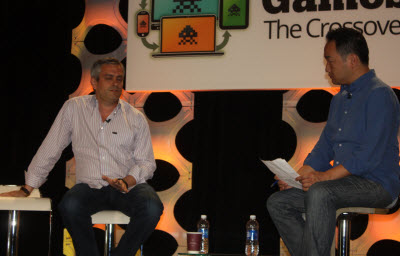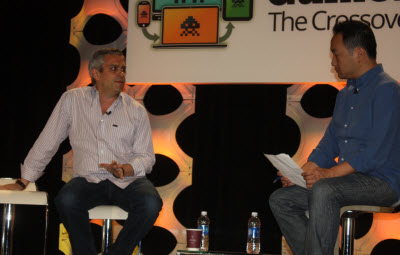 GamesBeat: Switching gears a little bit, you left EA in — was it 2008?
GamesBeat: Switching gears a little bit, you left EA in — was it 2008?
Young: Yeah.
GamesBeat: Back then, social gaming wasn’t as big as it is now. Mobile gaming wasn’t as big. Have your experiences working with a big publisher like that helped or hindered your work in the mobile space?
Young: I look back on my time at EA really fondly. I love Electronic Arts. It really is — despite the bad rap it sometimes gets — a great company with great people. I learned a lot. I owe a lot to EA for teaching me how to think about businesses that actually try to be games businesses instead of things that are built to sell.
Previously, earlier in my career when I worked at Virgin, the company felt like it was trying to reposition itself. It was trying to sell itself. Whereas when I joined Electronic Arts, I realized that you could build a big company focused on the games space that was where a good blend of art and science could come together on top of sound business principles and build something really good. I think I took away from Electronic Arts a sense that if you’re going to try and build a game business, try to build a game business. Don’t try to build a company for sale. Try to build something that fundamentally is profitable and successful and good.
I also took away from Electronic Arts that you have to have to scale. Whether it’s because the asset demands of your products or the time demands increase or because your organization increases, you’re going to have to scale. And when you scale, the process is very important. You can overbuild your process and underbuild your process, and you have to be right in the middle.
GamesBeat: What didn’t you like?
What I didn’t like about Electronic Arts at the time that I left [was] really two things. One, the economics of the console game business looked to me to be impossible to sustain. The number of hits was getting fewer, the development costs were rising, [and] the team sizes were crazy. It just felt like you can’t sustain that. We were seeing lots of companies start falling by the wayside — fewer and fewer companies competing for fewer and fewer slots — and that would turn most businesses from growth companies to sort of sustaining companies. That didn’t seem very exciting. So I didn’t like that.
And the other thing I didn’t like was, man, it is really hard to move fast in a company like that. When I left EA to start Ngmoco, I really felt like we’re so fast. I’ve actually felt that every single day since I left EA. It’s like, man, time is my enemy, I’ve got to go so quickly, I have to figure out this business model for Ngmoco as quickly as possible. Oh, shit. Premium games aren’t going to work! I’ve got to get to free-to-play! Oh, free-to-play — that’s going to take me forever to build a multi-hundred-million-dollar company. Well, I’ve got to change again. And I still feel that today at DeNA.
One of the things that I love about DeNA is just that pace of evolution and learning. Constantly looking at things and trying to change. You realize that holding a game to release it is a mistake. Get it out there and start iterating it and figure out how to hold down the number of users so you’ve got enough real people telling you what your game is actually like. Throw away your pride that your first reviews come out at 2.5 or 3 stars and just iterate. Iterate the fuck out of your products. Build systems that allow you to do that so you can be faster and better and more effective than everybody else. It’s the only way that you’re going to win. That sense of urgency, when I left EA, didn’t exist. And maybe it exists there now.
 GamesBeat: It’s probably helpful that you’re running everything at this point — that you’re the top decision-maker at Ngmoco as opposed to EA.
GamesBeat: It’s probably helpful that you’re running everything at this point — that you’re the top decision-maker at Ngmoco as opposed to EA.
Young: I had a pretty good gig at EA. It was really wonderful. The company really supported me.
When you’re the CEO, you get to make a lot of choices. But we didn’t have anything like the cash. That’s another constraint. Every action you take, you hear this kind of ka-ching, ka-ching in the back of your head as your bank balance is going down.
When you start shipping a product and it peaks — when Rolando came out and it was at the top of the charts over Christmas, it was killing it, you’re watching your bank account do this [go up], and then you go, “Oh no! Paid App Store!” That cycle creates a lot of distractions and depression.
GamesBeat: You have talked about how in the mobile space there’s a lot to learn from Japan’s success. After these years of studying user behavior, what worked there could work here very easily. It doesn’t seem like that’s necessarily the case with the more hardcore, traditional console market where we see a lot of Japanese-developed games. Maybe they don’t have quite the same kind of appeal here even with all the localization. Have you figured out why that might be? Why Westerners seem to be tiring of Japanese games? It’s not like it was in the ’90s, where Japan was a powerhouse in the console market. Tastes have changed, but why is that true in the console market and not necessarily mobile?
Young: I think that is a function of the decline of the Japanese console business and the traction in that market. If you look at the results of a Konami or a Capcom, you’ll see so much more of their emphasis and focus now is on the social games business as they’ve tried to stem their losses in the traditional core games space and focus on social and mobile in Japan.
Just a quick approximation of the industry side. Take DeNA’s revenue and Gree’s revenue and a few other people — it’s between 4.5 billion to 5 billion U.S. dollars a year. If you add it up, all of these social and mobile game companies here in the Western world, you struggle to get over 400 or 500 million dollars in revenue.
If you compare and contrast that with traditional console, Japan represents about 15 percent of global console sales business, and 85 percent of it is the rest of the world. So as Japanese developers, I think, found it difficult to make their games successful in the West, they refocused themselves on the market that they did know and that they did understand, which was actually quite a big business and quite right for them to move into.
I think that will change over time. I firmly believe that the market for social and mobile games on iOS — whether that’s on a phone or a tablet or a television, or Android on phones or tablets or television — I think it’s a 30-billion- or 40-billion-dollar-a-year business. We’re at the very beginning of that shift. At DeNA, we’ve been investing in trying to position ourselves to leverage what we know and [to] be a leader in the market globally. I think in that process, we’ll be able to help any developer — whether they’re a Western developer or a Japanese developer [or] a developer in China or Korea — reach a global market and be successful. That’s our goal.
![]() Design is determining the winners in everything mobile. The most successful players are focusing on one thing: How to make products, services, and devices as compelling and delightful as possible – visually, and experientially. MobileBeat 2012, July 10-11 in San Francisco , is assembling the most elite minds to debate how UI/UX is transforming every aspect of the mobile economy, and where the opportunities lie. Register here.
Design is determining the winners in everything mobile. The most successful players are focusing on one thing: How to make products, services, and devices as compelling and delightful as possible – visually, and experientially. MobileBeat 2012, July 10-11 in San Francisco , is assembling the most elite minds to debate how UI/UX is transforming every aspect of the mobile economy, and where the opportunities lie. Register here.
VentureBeat's mission is to be a digital town square for technical decision-makers to gain knowledge about transformative enterprise technology and transact. Learn More
